|
|
|
Sort Order |
|
|
|
Items / Page
|
|
|
|
|
|
|
| Srl | Item |
| 1 |
ID:
131446
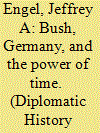

|
|
|
|
|
| Publication |
2013.
|
| Summary/Abstract |
George H.W. Bush backed German reunification with a puzzling degree of enthusiasm. His strategic reasoning was clear and not in dispute, as he desired to keep a unified Germany enmeshed within NATO. Less obvious, however, is his general forgiveness of Germany's past, for which he was pilloried. Yet history was much on Bush's mind in reaching these decisions. Germans had learned from the past, he argued. Europeans had not. They could not keep the peace no matter their ongoing political consolidation, his administration concluded by reading European history, without Americans in their midst. Bush backed unification, therefore, to ensure NATO's survival and thus an ongoing American presence on the continent. By studying Bush's sense of history, and a policymaker's historical sensibility more broadly, historians can thus gain greater insight into this decision and how strategic decisions are more generally formed
|
|
|
|
|
|
|
|
|
|
|
|
|
|
|
|
| 2 |
ID:
140245


|
|
|
|
|
| Edition |
1st ed.
|
| Publication |
Harlow, Pearson Education Limited, 2000.
|
| Description |
xviii, 423p.: tables, figures, textspbk
|
| Series |
Longman Contemporary Europe Series
|
| Standard Number |
0582357144
|
|
|
|
|
|
|
|
|
|
|
|
Copies: C:1/I:0,R:0,Q:0
Circulation
| Accession# | Call# | Current Location | Status | Policy | Location |
| 044730 | 943.087/ALL 044730 | Main | On Shelf | General | |
|
|
|
|
| 3 |
ID:
153295
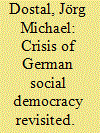

|
|
|
|
|
| Summary/Abstract |
This article analyses the dramatic electoral decline of German social democracy since 2003. It argues that the SPD's decision, under the leadership of former Chancellor Gerhard Schröder, to engage in welfare state retrenchment and labour market deregulation during the ‘Hartz reforms’ (2003–05) demoralised the SPD electorate. The SPD subsequently lost half of its former electoral coalition, namely blue-collar voters and socially disadvantaged groups, while efforts to gain access to centrist and middle-class voters have failed to produce any compensating gains. While the SPD's decline from a large to a mid-sized party is part of a larger transformation of the German party system, no political recovery is possible for social democracy without a fundamental change of strategy, namely efforts to regain former voters by offering credible social welfare and redistributive policies. The SPD will not be able to delegate such policies in a ‘convoy model’ to other parties, such as the Left Party; nor will a modest ‘correction’ of the earlier course, such as has been attempted since 2009 under the leadership of current party chairman Sigmar Gabriel, be sufficient to recover lost electoral ground.
|
|
|
|
|
|
|
|
|
|
|
|
|
|
|
|
| 4 |
ID:
185644
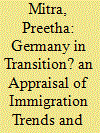

|
|
|
|
|
| Summary/Abstract |
This article examines Germany’s response to the European migrant crisis of 2015–2016 by analysing immigration and identity debates in Germany and their impact on German politics. The refugee crisis sharply divided the European Union and raised questions relating to immigration, humanitarian assistance and the duties towards those fleeing war and persecution. In such a scenario, Chancellor Angela Merkel’s decision to admit more than a million refugees had deep ramifications not only for German politics but also European and international politics at large. After the initial wave of support subsided, xenophobic and right-wing factions emerged, and public opinion began to turn against Merkel. The emergence of such sentiments is at odds with Germany’s complicated relationship with nationalism and right-wing politics in the post-war era. It is this juxtaposition that the article aims to analyse; whether the response to the refugee crisis proves that Germany is on the path to becoming a more inclusive society despite the presence of deep-rooted xenophobic elements. In order to do so, this article has focused on the complex relationship between party politics, immigration trends and identity debates in Germany and its impact on contemporary German politics as a whole.
|
|
|
|
|
|
|
|
|
|
|
|
|
|
|
|
| 5 |
ID:
170906


|
|
|
| 6 |
ID:
170904


|
|
|
|
|
| Summary/Abstract |
When the editors of the Palestine-Israel Journalasked me to contribute to this special issue, I was both flattered and frustrated. Flattered because of the recognition of what such an invitation entails, given that I gave up writing on Palestine-Israel matters a long time ago, and frustrated because I didn’t have the time to do the research needed to address the subject in a fair and comprehensive manner and to give justice to the details of possible developments that I may be unaware of in the official position of the German Government or the positions of the disparate German political parties. So, the editors and I agreed that I would write a brief viewpoint. The following is just that.
|
|
|
|
|
|
|
|
|
|
|
|
|
|
|
|
| 7 |
ID:
152667
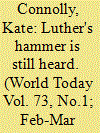

|
|
|
| 8 |
ID:
024588
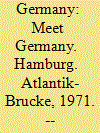

|
|
|
|
|
| Publication |
Hamburg, Atlantik-Brucke, 1971.
|
| Description |
131p.Pbk
|
|
|
|
|
|
|
|
|
|
|
|
Copies: C:1/I:0,R:0,Q:0
Circulation
| Accession# | Call# | Current Location | Status | Policy | Location |
| 006810 | 943.087/GER 006810 | Main | On Shelf | General | |
|
|
|
|
| 9 |
ID:
061099
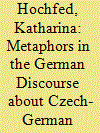

|
|
|
|
|
| Publication |
Winter 2004-05.
|
|
|
|
|
|
|
|
|
|
|
|
|
|
|
|
| 10 |
ID:
141760
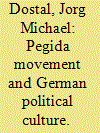

|
|
|
|
|
| Summary/Abstract |
This article outlines the rise and fall of the ‘Patriotic Europeans against the Islamisation of the West’ (Pegida), a right-wing populist street movement that originated in the city of Dresden in October 2014 and peaked in January 2015. The Pegida movement combined fear of ‘Islamisation’ with general criticism of Germany's political class and the mainstream media. This ambivalent and largely undefined political profile proved its strength in mobilising a significant minority of right-wing citizens in the local context of Dresden and the federal state of Saxony, but generally failed to spill over to other parts of Germany. The social profile of the Pegida movement, which included ‘ordinary citizens’ with centre-right to far-right attitudes, points to significant overlap between general disenchantment of the political centre ground in Germany with the political system, as outlined in recent sociological research, and the ability of a largely leaderless populism to mobilise in the streets.
|
|
|
|
|
|
|
|
|
|
|
|
|
|
|
|
| 11 |
ID:
170909
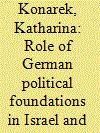

|
|
|
|
|
| Summary/Abstract |
The German Political Foundations: Think-and-Do Tanks in a Globalized World
Before discussing the work of German political foundations abroad, an important remark on the terminology and the concept of ‘foundation’ must be made. The German term is ‘Stiftung.’ ‘Stiftungen’ in the sense of the creator of the word – the Greek philosopher Plato – are purely non-profit organizations administrated by a board of trustees. Nowadays, they are civil law entities that, with the aid of property and assets, pursue a purpose defined by their founder.1 German political ‘Stiftungen’ differ from such organizations in the traditional understanding of the word. Rather, these are registered associations that use the term ‘Stiftung’ as a name component. Compared to more traditional ‘Stiftungen,’ they do not own large properties and are not bound by the goals of any founder. They can organize their agenda and program flexibly, while at the same time benefiting from the positive associations of the term ‘Stiftungen.’ As classical foundations, however, German political foundations are non-profit organizations whose purpose is to promote political education and strengthen democracy and civil society.
|
|
|
|
|
|
|
|
|
|
|
|
|
|
|
|
| 12 |
ID:
127690


|
|
|
|
|
| Publication |
2014.
|
| Summary/Abstract |
THE FALL OF THE BERLINWALL IN 1989, THE REUNIFICATION OF GERMANY a year later, and unlimited access granted to scholars to former East German archives in the aftermath of these momentous events, enabled the publication from the mid-1990s onwards of the first exhibition catalogues, monographs, journal articles and edited collections on the subject of consumption in the GDR (Merkel &Mu¨hlberg 1996; Zatlin 1997, 1999; Merkel 1998, 1999; Kaminsky 2001; Heldmann 2001; Poutrus 2002). While many of these works were initially written in German, less than a decade later, during the 2000s, a bourgeoning literature looking at key aspects of East German consumption emerged in English as well (Crew 2003; Stitziel 2005; Landsman 2005; Zatlin 2007; Rubin 2008, 2009). Inspired by some pioneering studies such as those of Jonathan Zatlin and Ina Merkel, the new works emphasised the close relationship between the party-state and the consumer desires of millions of citizens in the GDR. Be it about acquiring a Trabant, modern furniture, plastic goods, fashionable shoes and dresses, and even owning expensive collections of erotic photographs (McLellan 2009), such manifestations of individual consumer desires spoke about the centrality of consumption as practice, expectation and social imaginary in the lives of East Germans. After their strong focus on the former GDR, scholars of consumption under communism have lately shifted their interest to an examination of socialist consumerism in the Eastern
Bloc as a whole. The books under review here are the most recent manifestations of this shift. Through their wider geographic coverage, the three books discussed in this article further expand on and provide nuance to what we already know about the avatars of consumption under communism.
|
|
|
|
|
|
|
|
|
|
|
|
|
|
|
|
| 13 |
ID:
032045


|
|
|
|
|
| Publication |
New Haven, Yale University Press, 1987.
|
| Description |
viii, 228p.Hbk
|
| Standard Number |
0300038658
|
|
|
|
|
|
|
|
|
|
|
|
Copies: C:1/I:0,R:0,Q:0
Circulation
| Accession# | Call# | Current Location | Status | Policy | Location |
| 028645 | 943/TUR 028645 | Main | On Shelf | General | |
|
|
|
|
| 14 |
ID:
170960


|
|
|
|
|
|
|
|